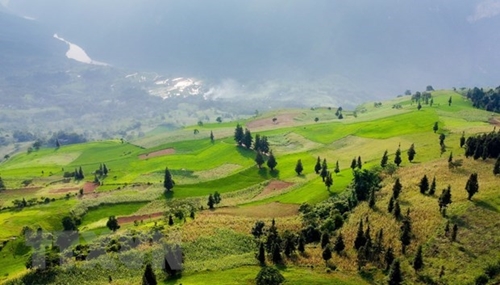At the World Travel Awards (WTA) 2023 held in Ho Chi Minh City on September 6, the Northern mountainous province which is famous for its dangerous mountain passes beat nine other rivals to the honor, Bandar Seri Begawan in Brunei, Flores in Indonesia, Koh Kood in Thailand, Melaka in Malaysia, Morioka and Okinawa in Japan, Phnom Penh in Cambodia, Sumba Island in Indonesia, and Taipei in Taiwan (China).
    |
 |
|
Xin Man district in the Northern highlands province of Ha Giang |
“Asia's leading emerging destination” is an important category in the WTA, focusing on evaluating related criteria such as environmental landscape, cultural identity, heritage values, security, safety, and civilized friendly people, and experiences.
Being honored at the award known as the "Oscar of the world tourism industry," Ha Giang's image has been enhanced, affirming its important and solid position on the regional tourism map, Quy said. The award is a clear testament to the efforts that the Ha Giang tourism industry has made.
According to the provincial official, the province has mobilized resources to develop its tourism, improve tourism linkages with other localities in Vietnam and promote its tourism on digital platforms.
According to the provincial Department of Culture, Sports and Tourism, the province attracted about 2.3 million visitors in 2022, and posted tourism revenue of over 4.5 trillion VND (187 million USD).
In the first eight months of this year, it welcomed more than 1.9 million visitors including nearly 189,000 international visitors. Total tourism revenue was estimated at nearly 4 trillion VND.
Ha Giang tourism has been developing in a sustainable way, turning the province into an attractive destination for domestic and international tourists and gradually becoming a key economic sector of the province.
Ha Giang is an old land, home to more than 20 ethnic groups, the H'mong, Tay, Dao, Nung, and Giay, who have their own traditional culture, lifestyle and customs, plus exciting festivals for visitors and researchers.
The region embraces many historical relics and majestic landscapes, such as the Heaven Gate, the Quan Ba double mountains in Quan Ba district; the H'mong King’s Vuong Palace, the Lung Cu National Flag Pole in Dong Van district; the Ma Pi Leng Pass in Meo Vac district; and picturesque terraced fields in Hoang Su Phi, and more. They attract many visitors to come for fun or for research.
In 2010, the Dong Van Karst Plateau in Dong Van district was officially recognized by UNESCO as a global karst geo-park, the first of its kind in Vietnam and the second in Southeast Asia (after the Langkawi Park in Malaysia).
Source: VNA